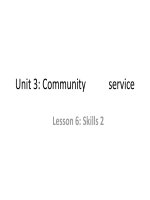Unit 04 our customs and traditions lesson 6 skills 2 kho tài liệu học tiếng anh
Bạn đang xem bản rút gọn của tài liệu. Xem và tải ngay bản đầy đủ của tài liệu tại đây (648.27 KB, 16 trang )
Teacher: Tran Hoang Yen
Making chung cake at Tet hodiday
customs / traditions
Wednesday, October 26th, 2016
UNIT 4 OUR CUSTOMS AND TRADITIONS
Lesson 6: SKILLS 2
I. LISTENING
They perform xoe dance
Wednesday, October 26th, 2016
UNIT 4 OUR CUSTOMS AND TRADITIONS
Lesson 6: SKILLS 2
I. LISTENING
- express (v) biểu lộ, diễn đạt
- unity (n)
sự thống nhất
- spiritual (adj) (thuộc) tâm linh, tinh thần
- reflect (v)
phản ánh
- ancient ( adj) very old
2. Listen and complete the table with no more than three words
What is the tradition?
The xoe dance
What does the dance express?
Working life and wishes for a (1)
_________________
Happy and wealthy life
Where do they perform xoe?
Private gatherings
Public and (2) ______________________
How many xoe dance forms are
there?
30
More than (3) ________________
What is the most popular form?
(4)_______________
Circle dance
Why is it the most popular?
social
It expresses (5) _____________unity
How do people perform it?
fire
Make a circle around the (6) ___________
and
music
dance to (7)_______________
Why should they continue this
tradition?
It reflects Thai (8) ____________________
Culture and lifestyle
3. Listen again and tick () true (T) or fasle (F).
T
1. The xoe dance is a spiritual tradition of Thai
ethnic people.
F
2. There are 16 ancient forms of xoe.
6
3. Only young people perform the circle dance.
Young or old people
4. Dancers with conical hats, paper fans or
scarves are some forms of xoe.
5. The importance of xoe is expressed in an old
Thai song.
Wednesday, October 26th, 2016
UNIT 4 OUR CUSTOMS AND TRADITIONS
Lesson 6: SKILLS 2
I. LISTENING
II. WRITING
Wednesday, October 26th, 2016
UNIT 4 OUR CUSTOMS AND TRADITIONS
Lesson 6: SKILLS 2
I. LISTENING
II. WRITING
- clockwise (n)
theo chiều kim đồng hồ
- counter-clockwise (n)
theo ngược chiều kim đồng hồ
- reunite (v)
hội họp, xum họp
- honour (v)
thể hiện sự kính trọng
4. Work in pairs. Read about a traditional Japanese dances.
Make complete sentences, using the information given
What’s the tradition?
The Obon dance
What does the dance
express?
People honouring their ancestors
When do people perform the
Obon dance?
Obon festival, in mid-August in many
regions of Japan and in mid-July in other
regions
How many Obon dance forms Different forms in different regions
are there?
What is the most typical
form?
Circle dance
How do people perform it?
Make a circle around a yagura, a high
wooden stage; some dancers move
clockwise, and some counter-clockwise
Why should they continue
this tradition?
One of the most important traditions; lots
of people come back to reunite with their
families during the Obon festival
What’s the tradition?
The Obon dance
The Obon dance is a tradition.
The Obon dance is a traditional Japanese dance.
4. Work in pairs. Read about a traditional Japanese dances. Make
complete sentences, using the information given
What’s the tradition?
The Obon dance
What does the dance express?
People honouring their ancestors
When do people perform the
Obon dance?
Obon festival, in mid-August in many
regions of Japan and in mid-July in other
regions
How many Obon dance forms
are there?
Different forms in different regions
What is the most typical form?
Circle dance
How do people perform it?
Make a circle around a yagura, a high
wooden stage; some dancers move
clockwise, and some counter-clockwise
Why should they continue this
tradition?
One of the most important traditions; lots of
people come back to reunite with their
families during the Obon festival
Example:
•The Obon dance is a traditional Japanese dance.
• People celebrate this festival to honour their
ancestors.
•Obon festival takes place in mid- August many
regions in Japan and in mid-July in other regions.
•There are different forms in different regions.
• The most typical form is circle dance.
•People make a circle around a yagura with
• a high wooden stage while some dancers me
clockwise and some counter-clockwise.
•They should continue this tradition because this
is one of the most import traditions.
• Lots of people come back to reunite with their
families during the Obon festival.
5. Now write a description about customs and traditions and have
chosen to write about the Obon dance..
There is a tradition in Japan that people pen the Obon
dance during the Obon festival. People celebrate this
festival to honour their ancestors. Obon festival takes
place in mid- August in many regions in Japan and in
mid-July in other regions. There are different forms in
different regions. The most typical form is circle dance.
People make a circle around a yagura with a high
wooden stage while some dancers me clockwise and
counter-clockwise. They should continue this tradition
because this is one of the most import traditions.
therefore, lots of people come back to reunite with their
families during the Obon festival.
THANK YOU
FOR YOUR ATTENTION !
Goodbye!
Celinne Dion – And so this is Xmax









